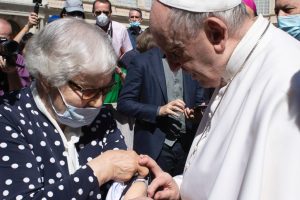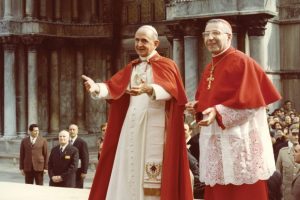In the first half of the 20th century, when the church at least seemed more organized, an inquiring Catholic could draw on an organizational chart of the various folks in heaven and on Earth. There was God, along with the angels and the saints up there.
We also had a way of viewing church members by their current condition: the church triumphant, who had walked the streets of gold through the pearly gates and now enjoyed eternal happiness; then the church suffering, who had a future lock on heaven after doing time in purgatory for temporal punishment due to sin; and then the church militant, who were still fighting the good fight on Earth to stay out of hell and someday get to heaven. That was us.
But from the very start, the church had way to bridge the gaps between the various groups. St. Paul made it confusing right off the bat by referring to some people living on Earth as “saints.” Huh? He’d send letters to the “saints” in Corinth, Rome, and other cities of apostolic fame. For Paul, all believers were saints, whether living or dead. Then, years later, a line appeared in the Apostles’ Creed: “We believe in the communion of saints.”
Over the years, Catholic practice has tended to narrow the idea of communion of saints into a process of living people praying for the eternal repose of dead people and asking the souls of the dead people to put in a good word up there for us earthbounds back here.
We say Masses for the dead, gain indulgences for them—but mostly we just pray for them, especially those who were nearest and dearest. Our prayers mix with tears, and we’re sure that, somehow, this all makes sense.
From childhood on, my prayer life was also pretty structured. I had a whole group of living people that I prayed for daily (“Help Grandpa get better from his heart attack”; “Help the starving kids in China”; “Help my daughters meet guys even we think are cool”). Then, way over here in this other prayer bucket, I prayed for people by name who had died, some of whom I had never met but was sorry had died.
Then, a few years ago, I even began to “prayer-talk” immediately to someone when I first heard they died. Slowly, I realized I was talking to them instead of praying for them. The fact that this may make no sense hasn’t stopped me.
But the biggest change in my whole view of saintly communion happened when my dad died in 1995. I simply refused to switch him over into the “dead” bucket. I still pray for Mom and Dad daily, as I had for years, as a living couple. No change, no gaps, no barriers.
The fact that Paul told me to do this a couple of millennia ago is slightly embarrassing, but I’m glad I finally caught on. The gap, in my “prayer-mind,” between heaven and Earth keeps narrowing.
Then my father-in-law died of Alzheimer’s in 1998, and my mother-in-law got the same disease at about the same time. We needed to move her 1,000 miles to live near us, and I needed to wrack my prayer-mind once again for guidance. What kind of communion do I have with someone I love deeply—whose body is still here but whose mind is slowly, steadily slipping away?
First, we decided to honor her Christian history. She’s a lifelong Methodist; so one week my wife, Jacquie, and I take her to a Methodist church in our area, and the next week we take her with us to our Catholic church. Some days we sing a hymn or two from a songbook she keeps in her room at the assisted-living home. No matter what church we attend, she is effusively grateful to be with us, to pray and sing with us.
Let’s reverse that image completely.
My prayer-mind tells me my wife and I are doing a fine thing here: faithful, dedicated grown children doing the right thing by an aging, slipping parent. Just recently, however, something more like a “prayer-heart” is edging my prayer-mind aside and urging a clearer vision.
Jacquie and I, our daughters, and our nearby relatives and friends have been granted a great privilege in this communion of saints. It takes a prayer-heart to stop asking why, to quit wondering when, to cast aside the need for logic and understanding—to simply kiss and hug and hold hands and laugh and cry and realize that, in the end, a human being doesn’t have to do anything. We are grateful we get to be with her, to pray with her, to sing with her during her long goodbye. Amen.
Image: Unsplash/Pedro Dias













Add comment